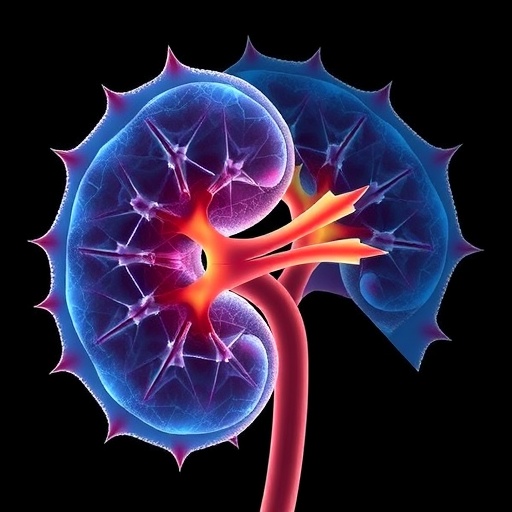
In a groundbreaking study published in the Journal of Eating Disorders, researchers are delving into the intricate relationship between executive functioning, food addiction, disordered eating attitudes, and metabolic syndrome among adolescents enrolled in obesity treatment programs. This research, led by İçen et al., represents a significant contribution to understanding how cognitive processes interact with dietary behaviors and health outcomes in young populations grappling with obesity.
At the heart of this research lies the concept of executive functioning, a set of cognitive processes that include working memory, flexible thinking, and self-control. These functions play a crucial role in an individual’s ability to manage their impulses and make healthier lifestyle choices. The study aims to explore how deficiencies in these cognitive abilities correlate with an increased risk of food addiction and disordered eating patterns among adolescents, who are at a vulnerable stage of development.
Food addiction, often characterized by compulsive eating behaviors and a preoccupation with food, has garnered significant attention in recent years. The study highlights that adolescents struggling with obesity frequently exhibit signs of food addiction, which can complicate their treatment efforts. By examining the interplay between executive functioning and these addictive behaviors, the researchers hope to unveil the psychological underpinnings that contribute to obesity in this age group.
Disordered eating attitudes, encompassing a range of unhealthy relationships with food, are also linked to executive functioning. Adolescents often face societal pressures and personal struggles that can lead to dysfunctional eating behaviors. These include restrictive dieting, binge eating, and emotional eating. In the context of the study, understanding how executive functioning impacts these attitudes is crucial in developing comprehensive treatment plans tailored specifically for adolescents with obesity.
The researchers employed a cross-sectional analysis, allowing them to gather data from a diverse pool of adolescents seeking obesity treatment. This method provides a snapshot of the participants’ cognitive functions and eating behaviors at a single point in time, which is beneficial for identifying trends and correlations. Through standardized assessments, participants’ executive functioning, eating attitudes, and metabolic health markers were meticulously evaluated.
Metabolic syndrome, characterized by a cluster of conditions including increased blood pressure, high blood sugar levels, excess body fat around the waist, and abnormal cholesterol levels, poses significant health risks. Adolescents with obesity frequently present these risk factors, which can lead to long-term health complications such as diabetes and cardiovascular disease. By connecting metabolic syndrome markers with the cognitive and behavioral aspects of eating, the researchers aim to highlight the multifaceted nature of obesity.
One of the most pressing issues tackled in the study is the stigma surrounding obesity and disordered eating among adolescents. Many young individuals face bullying, discrimination, and social isolation due to their body weight. This societal stigma can significantly impair their mental health and make it even more challenging to seek help. By fostering a better understanding of the psychological components of obesity, the research advocates for more compassionate approaches in treating affected adolescents.
In addition to identifying the links between executive functioning and eating disorders, the study suggests potential interventions that could enhance cognitive abilities in adolescents. These interventions might include cognitive-behavioral therapy, mindfulness practices, and structured skill-building programs that focus on improving decision-making and impulse control. By equipping adolescents with better cognitive tools, it may be possible to mitigate the impacts of food addiction and disordered eating behaviors more effectively.
Furthermore, the research provides a foundation for future studies aimed at exploring the efficacy of various treatment modalities tailored to address both cognitive and behavioral components of obesity. By integrating psychological support with nutritional guidance and physical activity programs, healthcare providers could create more holistic approaches that cater to the diverse needs of adolescents struggling with weight-related issues.
As the prevalence of obesity continues to rise globally, understanding the interplay between cognitive functioning, addictive eating behaviors, and metabolic health becomes increasingly important. This study sheds light on the urgent need for comprehensive, interdisciplinary strategies in addressing youth obesity. There is hope that by addressing the cognitive and emotional aspects of eating, adolescents may find healthier pathways to manage their weight and improve their overall well-being.
Research of this caliber not only expands our understanding of the psychological factors associated with obesity but also emphasizes the importance of empathy in treatment. Adolescents are navigating a complex landscape of physical, emotional, and social challenges associated with obesity. With the insights gleaned from this study, healthcare professionals can craft more informed, sensitive approaches that recognize the intricate web of factors that contribute to unhealthy eating habits and obesity.
Ultimately, the findings of this study not only provide a scientific basis for understanding the connections between executive functioning and eating behaviors but also advocate for a shift in how we approach the issue of adolescent obesity. By bridging the gap between cognitive science and nutritional health, we can work toward a future where adolescents receive comprehensive support that empowers them to achieve healthier lifestyles.
As we move forward in addressing the pressing issue of youth obesity, it is critical to remember that effective interventions must encompass not only the physical aspect of health but also the mental and emotional dimensions. This multifaceted approach will ensure that adolescents not only achieve better health outcomes but also cultivate a positive relationship with food and their bodies, paving the way for lifelong wellness.
In conclusion, the research conducted by İçen et al. is a landmark study that opens new avenues for exploring the challenges faced by adolescents with obesity. By understanding and addressing the cognitive barriers to healthy eating and weight management, we can create a more inclusive and effective framework for combating the obesity epidemic among youth.
Subject of Research: Executive functioning difficulties in relation to food addiction and disordered eating attitudes among adolescents.
Article Title: Executive functioning difficulties in relation to food addiction, disordered eating attitudes, and metabolic syndrome markers among adolescents seeking obesity treatment: a cross-sectional analysis.
Article References:
İçen, S., TaÅ Torun, Y., DöÄer, E. et al. Executive functioning difficulties in relation to food addiction, disordered eating attitudes, and metabolic syndrome markers among adolescents seeking obesity treatment: a cross-sectional analysis.
J Eat Disord 13, 183 (2025). https://doi.org/10.1186/s40337-025-01377-w
Image Credits: AI Generated
DOI: 10.1186/s40337-025-01377-w
Keywords: executive functioning, food addiction, disordered eating attitudes, metabolic syndrome, adolescents, obesity treatment.
Tags: adolescent health and nutritionadolescent obesity treatment programscognitive deficits and obesitycognitive processes and dietary behaviorsexecutive functioning and metabolic healthexecutive functioning in adolescentsfood addiction and disordered eatinghealthier lifestyle choices for youthimpulsive eating behaviors in teenagersmetabolic syndrome in youthpsychological factors in obesityunderstanding food addiction in adolescents




